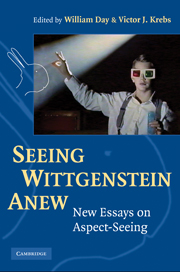Book contents
- Frontmatter
- Contents
- List of Contributors
- Acknowledgments
- Abbreviations of Wittgenstein's Works
- Seeing Wittgenstein Anew
- Introduction: Seeing Aspects in Wittgenstein
- I ASPECTS OF “SEEING-AS”
- II ASPECTS AND THE SELF
- II.1 Self-Knowledge
- 5 In a New Light
- 6 The Bodily Root
- II.2 Problems of Mind
- III ASPECTS AND LANGUAGE
- IV ASPECTS AND METHOD
- Appendix: A Page Concordance for Unnumbered Remarks in Philosophical Investigations
- List of Works Cited
- Index
6 - The Bodily Root
Seeing Aspects and Inner Experience
Published online by Cambridge University Press: 05 June 2012
- Frontmatter
- Contents
- List of Contributors
- Acknowledgments
- Abbreviations of Wittgenstein's Works
- Seeing Wittgenstein Anew
- Introduction: Seeing Aspects in Wittgenstein
- I ASPECTS OF “SEEING-AS”
- II ASPECTS AND THE SELF
- II.1 Self-Knowledge
- 5 In a New Light
- 6 The Bodily Root
- II.2 Problems of Mind
- III ASPECTS AND LANGUAGE
- IV ASPECTS AND METHOD
- Appendix: A Page Concordance for Unnumbered Remarks in Philosophical Investigations
- List of Works Cited
- Index
Summary
When you are philosophizing you have to descend into primaeval chaos and feel at home there.
(CV 65b)From the very beginning of his philosophical work, Wittgenstein was concerned with “seeing.” The Tractatus' purpose, for example, was to change our perspective in order to dissolve philosophical problems and to bring us, as Wittgenstein himself puts it, “to see the world aright” (TLP 6.54). And in the “Lecture on Ethics,” Wittgenstein connects this aim with the ability to see the world as a miracle and not just as a scientific fact – an ability he suggests we need to cultivate if we are to make sense of a whole realm of human life that otherwise remains unintelligible. In the early 1930s in his “Remarks on Frazer's Golden Bough,” he sharpens that contrast while trying to show how Frazer's scientific posture blinds him, blinds us, to the symbolic meaning of primitive rituals. In all these moments, Wittgenstein is intent on recovering a depth to human experience that he believes is lost to scientific rationalism. And so he insists on the human significance of “transcendental” (ethical / aesthetic / religious) utterances despite their professed nonsensicality, just as he elaborates on the existential meaning of primitive rituals even if it is invisible to the scientific eye.
It is symptomatic that, in attempting to treat Frazer's blindness to this depth, Wittgenstein introduces the very method upon which he will reconceive his later philosophy.
Keywords
- Type
- Chapter
- Information
- Seeing Wittgenstein Anew , pp. 120 - 140Publisher: Cambridge University PressPrint publication year: 2010
- 2
- Cited by

